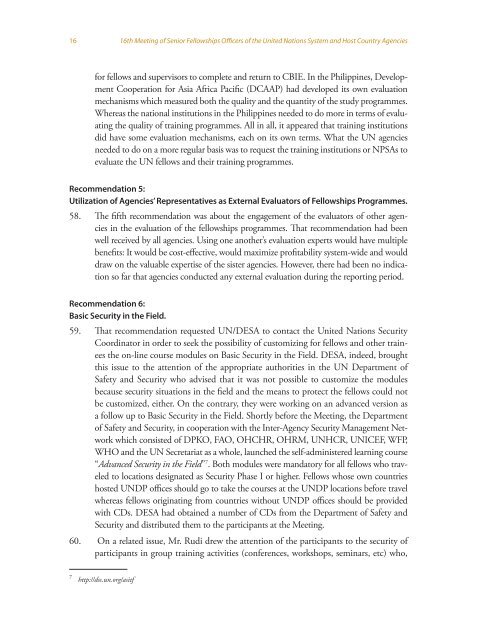16th Meeting of Senior Fellowships Officers of the ... - Development
16th Meeting of Senior Fellowships Officers of the ... - Development
16th Meeting of Senior Fellowships Officers of the ... - Development
Create successful ePaper yourself
Turn your PDF publications into a flip-book with our unique Google optimized e-Paper software.
16<br />
<strong>16th</strong> <strong>Meeting</strong> <strong>of</strong> <strong>Senior</strong> <strong>Fellowships</strong> <strong>Officers</strong> <strong>of</strong> <strong>the</strong> United Nations System and Host Country Agencies<br />
for fellows and supervisors to complete and return to CBIE. In <strong>the</strong> Philippines, <strong>Development</strong><br />
Cooperation for Asia Africa Pacific (DCAAP) had developed its own evaluation<br />
mechanisms which measured both <strong>the</strong> quality and <strong>the</strong> quantity <strong>of</strong> <strong>the</strong> study programmes.<br />
Whereas <strong>the</strong> national institutions in <strong>the</strong> Philippines needed to do more in terms <strong>of</strong> evaluating<br />
<strong>the</strong> quality <strong>of</strong> training programmes. All in all, it appeared that training institutions<br />
did have some evaluation mechanisms, each on its own terms. What <strong>the</strong> UN agencies<br />
needed to do on a more regular basis was to request <strong>the</strong> training institutions or NPSAs to<br />
evaluate <strong>the</strong> UN fellows and <strong>the</strong>ir training programmes.<br />
Recommendation 5:<br />
Utilization <strong>of</strong> Agencies’ Representatives as External Evaluators <strong>of</strong> <strong>Fellowships</strong> Programmes.<br />
58. The fifth recommendation was about <strong>the</strong> engagement <strong>of</strong> <strong>the</strong> evaluators <strong>of</strong> o<strong>the</strong>r agencies<br />
in <strong>the</strong> evaluation <strong>of</strong> <strong>the</strong> fellowships programmes. That recommendation had been<br />
well received by all agencies. Using one ano<strong>the</strong>r’s evaluation experts would have multiple<br />
benefits: It would be cost-effective, would maximize pr<strong>of</strong>itability system-wide and would<br />
draw on <strong>the</strong> valuable expertise <strong>of</strong> <strong>the</strong> sister agencies. However, <strong>the</strong>re had been no indication<br />
so far that agencies conducted any external evaluation during <strong>the</strong> reporting period.<br />
Recommendation 6:<br />
Basic Security in <strong>the</strong> Field.<br />
59. That recommendation requested UN/DESA to contact <strong>the</strong> United Nations Security<br />
Coordinator in order to seek <strong>the</strong> possibility <strong>of</strong> customizing for fellows and o<strong>the</strong>r trainees<br />
<strong>the</strong> on-line course modules on Basic Security in <strong>the</strong> Field. DESA, indeed, brought<br />
this issue to <strong>the</strong> attention <strong>of</strong> <strong>the</strong> appropriate authorities in <strong>the</strong> UN Department <strong>of</strong><br />
Safety and Security who advised that it was not possible to customize <strong>the</strong> modules<br />
because security situations in <strong>the</strong> field and <strong>the</strong> means to protect <strong>the</strong> fellows could not<br />
be customized, ei<strong>the</strong>r. On <strong>the</strong> contrary, <strong>the</strong>y were working on an advanced version as<br />
a follow up to Basic Security in <strong>the</strong> Field. Shortly before <strong>the</strong> <strong>Meeting</strong>, <strong>the</strong> Department<br />
<strong>of</strong> Safety and Security, in cooperation with <strong>the</strong> Inter-Agency Security Management Network<br />
which consisted <strong>of</strong> DPKO, FAO, OHCHR, OHRM, UNHCR, UNICEF, WFP,<br />
WHO and <strong>the</strong> UN Secretariat as a whole, launched <strong>the</strong> self-administered learning course<br />
“Advanced Security in <strong>the</strong> Field” . Both modules were mandatory for all fellows who traveled<br />
to locations designated as Security Phase I or higher. Fellows whose own countries<br />
hosted UNDP <strong>of</strong>fices should go to take <strong>the</strong> courses at <strong>the</strong> UNDP locations before travel<br />
whereas fellows originating from countries without UNDP <strong>of</strong>fices should be provided<br />
with CDs. DESA had obtained a number <strong>of</strong> CDs from <strong>the</strong> Department <strong>of</strong> Safety and<br />
Security and distributed <strong>the</strong>m to <strong>the</strong> participants at <strong>the</strong> <strong>Meeting</strong>.<br />
60. On a related issue, Mr. Rudi drew <strong>the</strong> attention <strong>of</strong> <strong>the</strong> participants to <strong>the</strong> security <strong>of</strong><br />
participants in group training activities (conferences, workshops, seminars, etc) who,<br />
<br />
http://dss.un.org/asitf

















